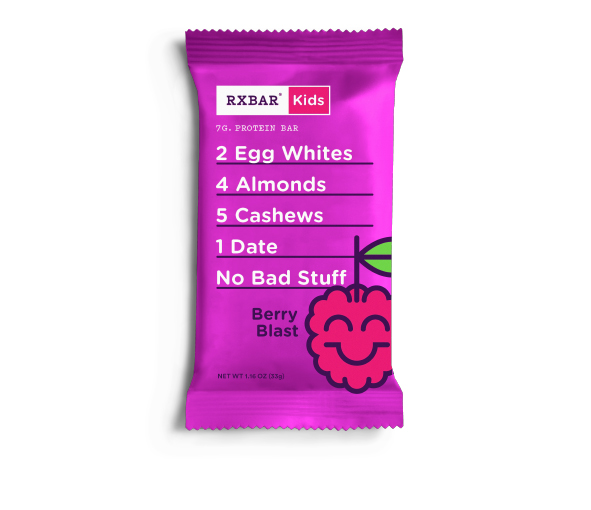School is back in session, and you’re ready to get back into a routine with the kids. That, of course, includes packing lunches. As you know, proper nutrition directly affects your child’s academic performance. But how do you get them away from the Cocoa Puffs and cookies?
The first step is cleaning out the junk food that’s loaded with sugar and making sure healthy food for kids is always readily available.
Once the kitchen is free and clear, start it’s time to start implementing these 5 nutrition tips to have a successful school year!
1. Start the Day with a Breakfast of Champions!
Sugary cereal with juice is not going to keep your child full and focused during their first few hours in the classroom. Sugar causes a quick burst of energy (high), followed by blood sugar levels dropping (low). Let’s take a quick example of a popular kids’ breakfast: 1 cup Cocoa Puffs (13 grams sugar) plus 1 cup apple juice (30 grams of sugar) is a whopping 43 grams of sugar! That’s 11 teaspoons of sugar first thing in the morning! A more balanced breakfast includes protein, healthy fat and low-glycemic carbohydrates.
Here are some healthy breakfast food options for kids:
- Breakfast sandwich on an Arnold’s Sandwich Thin with ham, egg and cheese
-
Amish oatmeal topped with fruit and nuts
- Carrot cake smoothie for picky eaters or breakfast on the go
2. Pack a Balanced Lunch
Everyone loves a good sandwich — they’re easy to pack and easy to eat. Thankfully, sandwiches can be a part of healthy school lunches with a couple small tweaks. First, swap the thick French bread for Arnold’s Sandwich Thins. These round bread slices are loaded with fiber, but don’t taste dry like most fibrous breads. For a good source of protein, stick to chicken, ham or turkey. Instead of processed cheese slices or mayonnaise, spread 1/4 of an avocado onto the bread. This will add moisture and healthy fats for a tasty meal kids will actually eat. To make it even more fun for little ones, make the round sandwich look like the head of your kid’s favorite animal (like a cat with carrot whiskers or a fish with strawberry scales). School lunch ideas don’t have to be complicated. Just make sure you’re incorporating a variety of whole foods with minimal to no processed foods. That means adding a piece of fruit, veggies and maybe a handful of pretzels to go with that healthy sandwich. Popular whole-food options include carrots sticks, cucumber rounds and bell pepper slices. These are colorful and offer a good mix of flavors and textures.
3. Drink Lots of Water
While juice is marketed as a healthy option for kids, it is loaded with added sugar. Try swapping out the juice for water and having a piece of fruit on the side. During the juicing process, many of the vitamins and fiber from the fruit are lost, leaving nothing more than “sugar water” behind. For a smart juice-box alternative, make your own by blending whole fruits and veggies in a food processor or blender. This kind of juicing retains all the beneficial nutrients. Make sure to incorporate 70% veggies and only one piece of fruit. Did you know it takes 3-4 apples to make only one cup of juice? But you wouldn’t eat 4 apples in one sitting, so stick with one in your homemade juice. Though pure water is your best option, you can also try infusing your kid’s glass with fresh fruit to jazz up the flavor and get them drinking more.
4. Snacking For Success
Healthy snacks can help your child stay focused in school and prevent over eating later in the day. We recommend balancing out your snacks with a healthy source of protein/fat and carbohydrate. Most of the snack foods geared towards kids are processed, low in fiber and high in sugar. Try finding snack options that will help your kids stay focused and full between meals!
Here are a few snack options:
- RX Kids Bar
- Apple with peanut butter
- Triple Zero Oikos Greek yogurt
5. A Balanced Dinner
Dinner should consist of lots of veggies, some protein and a little starch! Here’s a hint: corn does NOT count as a vegetable. In our kids’ program, they are encouraged to try a new vegetable every week. That doesn’t mean they have to eat an entire plate of a new vegetable, but it does mean they are expanding their taste buds and trying something new. Is your child a picky eater? Try incorporating veggies into the foods they love, such as pureed carrots into mac and cheese or mashed cauliflower into mashed potatoes. Try sneaking in pureed veggies into their spaghetti sauce. Looking for more healthy school lunches and dinners? Check out the book “Deceptively Delicious” by Jessica Seinfeld. You’ll find many more tasty ways to sneak in those veggies.
With every meal, the goal is: 1/3 of the plate dedicated to veggies, about the size of your child’s palm in protein and one fist full of starch. Pair it all with water or a cup of milk to drink.
Want more help with your child’s eating habits?










